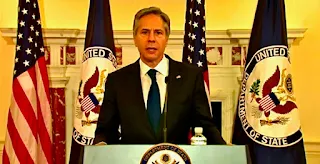 |
| Secretary of state Antony J. Blinken |
SECRETARY BLINKEN: There is obviously a tremendous amount of focus on what’s happening in Europe, in particular Russia’s ongoing buildup of forces near Ukraine. And that remains front and center in what we’re doing and indeed what I continue to do even as we’re heading to Australia.
I’ve been on the phone during a chunk of this trip talking to various counterparts with some focus on Russia-Ukraine. I spent some time talking to the National Security Advisor Jake Sullivan as well. And this is part of, as we’ve tabulated, with foreign counterparts something like 200-plus engagements just in recent weeks – phone calls, video conferences, in-person meetings, where we have been working to coordinate all of our partners in standing up to this Russian aggression directed toward Ukraine.
And as you all know, we have been engaged in a two-track strategy where we have, on the one hand, been pursuing diplomacy, by far the preferable course, the responsible course, but at the same time building up strong deterrence to dissuade Russia from taking aggressive action.
Having said that, the world is a big place. Our interests are global, and you all know very well the focus that we have put on the Asia-Pacific and Indo-Pacific region. And we ended last year with a trip that some of you were on, and we have a sustained focus on this, and that’s why we’re heading to Australia.
We’ll be first and foremost meeting with the Quad countries – Australia, Japan, India, the United States – following up on the leader level summit, the first ever that the President had, and pursuing the work that I think is vital to the interests of Americans but also people throughout the region and around the world. The Quad is becoming a powerful mechanism for delivering, helping to vaccinate a big part of the world and getting a lot of vaccines out there, strengthening maritime security to push back against aggression and coercion in the Indo-Pacific region, working together on emerging technologies and making sure that they can be used in positive ways not negative ways, and an increasingly broad and deep agenda.
At the same time, it’s an opportunity to meet with our Australian partners, meetings as well with Japanese and Indian counterparts – all critical partners both in terms of the Quad but also individually.
And one of the other reasons I want to emphasize the work that we’re doing with the Quad is it’s very representative of what we’re doing in different ways around the world, which is building, energizing, driving different coalitions of countries focused on sometimes overlapping issues. We’re doing that with established institutions like NATO or in Asia like ASEAN with our traditional alliances, but also with new groupings and coalitions of countries that can focus the strengths of different partners on issues that really, really matter, whether it’s climate, whether it’s COVID, whether it’s emerging technologies. The Quad’s one of the best examples of that.
I’ll also have a chance in Australia to spend some time with some incredible technologists at the University of Melbourne, students as well. Parenthetically, my late stepfather went to the University of Melbourne, so this will be a little bit of a homecoming in that sense, too.
And then after Australia we’re off, as you know, to Fiji. This is, I am told, the first time in nearly 40 years that a secretary of state has visited Fiji. There’s a very good reason for that: we’re a Pacific nation. The Pacific part of the Indo-Pacific Strategy is vitally important, and in the category of 90 percent of life is showing up or showing up; but more than showing up, I think you’ll see some very concrete things come out of the visit to Fiji. I’m not going to get ahead of myself, but we’ll have a few things to talk about when we get there. So I’m very much looking forward to that.
And then finally, of course, we end up in Hawaii, and there Japanese and Korean counterparts will come together. We’ve been spending a lot of time – Deputy Secretary Sherman and myself – on trilateral collaboration among the United States, Japan, and Republic of Korea. This is another opportunity to drive that forward. There is a very broad common agenda that we have, of course, starting with challenges posed by the DPRK but going well beyond that. This is an important moment to keep driving that forward.
We’ll also have a chance to spend time with our INDOPACOM commander, Admiral Aquilino, to talk about the work that we’re doing throughout the Indo-Pacific to advance stability, to advance security.
So we’re covering quite literally as well as figuratively a lot of territory. I’m looking forward also to seeing some of our State Department colleagues who have a hardship assignment in Honolulu when we end the trip. So that’s what we’re doing. There’s a lot that’s going to be said at each stop. We’ll have a chance to talk about specific issues that we’re focused on.
Meanwhile – the last thing I’ll say – even as we’re doing this we will be on the phones, on the video conference with other countries and counterparts, back in Washington, given everything that’s going on in Europe. And I expect, for example, to be speaking to French, Germans, British colleagues in the coming days, among many others. So I wanted to leave it at that.
Attribution: U.S. State Department
Comments :